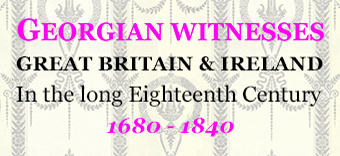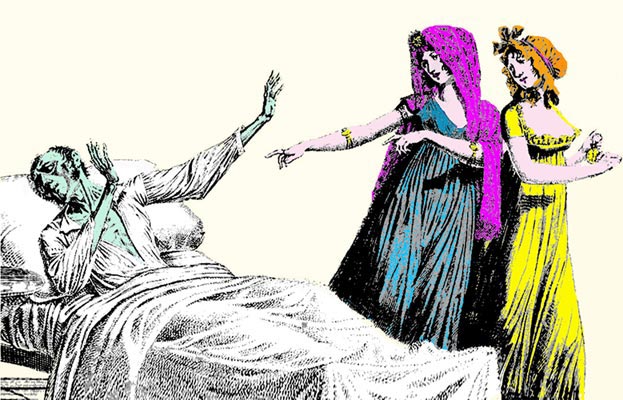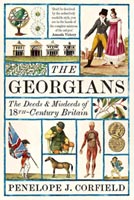Georgian Witnesses
11 / DEBATING GEORGIAN SOCIAL WELFARE & CRIME, INCLUDING MENTAL HEALTH, POVERTY AND THE DEATH PENALTY
THREE POETIC TESTIMONIES TO MENTAL DISTURBANCE & DESPAIR
11.1 Christopher Smart (1722 – 71): extract from Hymn to the Supreme Being, on Recovery from a Dangerous Fit of Illness (1756).
[The poem records despair, followed by deliverance, not by either good works or faith but through divine mercy]
… But, O immortals! [suns/ stars] What had I to plead
When death stood o’er me with his threat’ning lance,
When reason left me in the time of need,
And sense was lost in terror or in trance,
My sick’ning soul was with my blood inflam’d,
And the celestial image [the sun] sunk, defac’d and maim’d.
I sent back memory, in heedful guise,
To search the records of preceding years;
Home, like the raven to the ark, she flies,
Croaking bad tidings to my trembling ears.
O Sun, again that thy retreat was made,
And threw my follies back into the friendly shade!
[Divine redemption and forgiveness appear
offering hope of mental peace]
… Yet hold, presumption, nor too fondly climb,
And thou too bold, O horrible despair!
In man’s humility’s alone sublime,
Who diffidently hopes he’s Christ’s own care—
O all sufficient Lamb! in death’s dread hour
Thy merits who shall slight, or who can doubt thy power?
For further insights into Christopher Smart’s mental world while confined to an asylum, see also his extraordinary poem, Jubilate Agno [Rejoice in the Lamb] – complete with incantatory repetitions – which was written in fragments in the years 1758-63 and published posthumously in 1939. And for full context, see C. Mounsey, Christopher Smart: Clown of God (2001).
11.2 William Cowper (1731 – 1800): concluding verses of his final poem The Castaway (written 1799; published posthumously 1803 – 4).
[The poem tells of a sailor who has fallen overboard in a storm
and been left to drown by his shipmates,
who were unable to turn the ship in treacherous seas]
No poet wept him: but the page
Of narrative sincere;
That tells his name, his worth, his age,
Is wet with Anson’s tear. [Anson the explorer]
And tears by bards or heroes shed
Alike immortalize the dead.
I therefore purpose not, or dream,
Descanting on his fate,
To give the melancholy theme
A more enduring date:
But misery still delights to trace
Its semblance in another’s case.
No voice divine the storm allay’d,
No light propitious shone;
When, snatch’d from all effectual aid,
We perish’d, each alone:
But I beneath a rougher sea,
And whelm’d in deeper gulfs [depths] than he.
Cowper’s poem was prompted by reading s A Voyage Round the World in 1740-4 by George Anson, Esq. (1748), which included a mournful account of a shipmate being washed overboard in a tempest, when the crew were unable to stop and save him.
11.3 John Clare (1793 – 1864): I Am! (poem written 1844 or 1845, when Clare was resident in Northampton General Lunatic Asylum; published 1848).
I am – yet what I am none cares or knows;
My friends forsake me like a memory lost:
I am the self-consumer of my woes –
They rise and vanish in oblivious host,
Like shadows in love’s frenzied stifled throes
And yet I am, and live – like vapours tossed
Into the nothingness of scorn and noise,
Into the living sea of waking dreams,
Where there is neither sense of life or joys,
But the vast shipwreck of my life’s esteems;
Even the dearest that I loved the best
Are strange – nay, rather, stranger than the rest.
I long for scenes where man hath never trod
A place where woman never smiled or wept
There to abide with my Creator, God,
And sleep as I in childhood sweetly slept,
Untroubling and untroubled where I lie
The grass below – above the vaulted sky.
THREE TESTIMONIES TO THE TRAVAILS OF POVERTY AND THE NEED TO RETHINK ATTITUDES TO THE POOR
Policies were not changed by such poetic polemics; but they advocated new perspectives upon poverty 11.4 Oliver Goldsmith (1728 – 74): extract from The Deserted Village (1770).
… Sweet smiling village, loveliest of the lawn,
Thy sports are fled, and all thy charms withdrawn;
Amidst thy bowers the tyrant’s hand is seen,
And desolation saddens all thy green:
One only master grasps the whole domain,
And half a tillage stints thy smiling plain;
No more thy glassy brook reflects the day,
But, choaked with sedges, works its weedy way;
Along thy glades, a solitary guest,
The hollow-sounding bittern guards its nest;
Amidst thy desert walks the lapwing flies,
And tires their echoes with unvaried cries.
Sunk are thy bowers, in shapeless ruin all,
And the long grass o’ertops the mouldering wall;
And, trembling, shrinking from the spoiler’s hand,
Far, far away, thy children leave the land.
Ill fares the land, to hastening ills a prey,
Where wealth accumulates, and men decay:
Princes and lords may flourish, or may fade;
A breath can make them, as a breath has made;
But a bold peasantry, their country’s pride,
When once destroyed, can never be supplied. …
11.5 Thomas Spence (1750-1814): Edmund Burke’s Address to the Swinish Multitude (1794), being three verses from a longer poetic satire.
Ye Swinish Multitude who prate,
What know ye ’bout the matter?
Misterious are the ways of state,
Of which you should not chatter.
Our church and state, like man and wife,
Together kindly cuddle,
Together share the sweets of life,
Together feast and fuddle [get tipsy].
Chorus: Then hence ye Swine, nor make a rout,
Forbearance but relaxes;
We’ll clap the muzzle on your snout,
Go work – and pay your taxes.
Ye apron men, to labour bred,
How dare ye thus to quarrel;
We’ll take your children’s beer and bread,
And you shan’t smell the barrel.
’Tis ours to take your needful scot [local tax],
Whene’er we lack assistance;
Passive obedience is your lot.
And humble non-resistance.
Chorus: Then hence ye Swine [etc] …
No reformation you shall have,
We tell it to your faces:
Make every mother’s son a slave,
And yet we’ll keep our places.
In vain you swear at Billy Pitt [the Younger Pitt, Prime Minister],
At George [King George III] in vain you grumble;
We’ll take two-thirds of all you get
To keep you poor and humble.
Chorus: Then hence ye Swine [etc] …
Spence was satirising the political philosopher Edmund Burke (1729 – 97), who in 1790, horrified by the upheavals of French Revolution, referred to the masses as ‘a swinish multitude’: see H.T. Dickinson (ed.), The Political Works of Thomas Spence (Newcastle upon Tyne, 1982), pp. 124 – 5. Spence referred satirically to the doctrine of ‘non-resistance to the Lord’s Anointed [i.e. the monarch]’, which was a viewpoint current in right-wing political circles in the later seventeenth century, after the experience of Civil War and regicide.
[For more on Spence, see also
Witnesses-15.4]
11.6 Thomas Hood (1799 – 1845): five verses from The Song of the Shirt (1843).
With fingers weary and worn,
With eyelids heavy and red,
A woman sat, in unwomanly rags,
Plying her needle and thread –
Stitch! stitch! stitch!
In poverty, hunger, and dirt,
And still with a voice of dolorous pitch
She sang the “Song of the Shirt”.
… Work – work – work
Till the brain begins to swim;
Work – work – work
Till the eyes are heavy and dim!
Seam, and gusset, and band,
Band, and gusset, and seam,
Till over the buttons I fall asleep,
And sew them on in a dream!
O, Men, with Sisters dear!
O, men, with Mothers and Wives!
It is not linen you’re wearing out,
But human creatures’ lives!
Stitch – stitch – stitch,
In poverty, hunger and dirt,
Sewing at once, with a double thread,
A Shroud as well as a Shirt.
But why do I talk of Death?
That Phantom of grisly bone,
I hardly fear its terrible shape,
It seems so like my own –
It seems so like my own,
Because of the fasts I keep;
Oh, God! that bread should be so dear,
And flesh and blood so cheap!
Work – work – work!
My labour never flags;
And what are its wages? A bed of straw,
A crust of bread – and rags.
That shatter’d roof – and this naked floor –
A table – a broken chair –
And a wall so blank, my shadow I thank
For sometimes falling there! …
A classic diatribe against ‘sweated labour’ or work undertaken for long and unregulated hours, at low rates of pay (without a minimum guarantee), in unhealthy and uninspected conditions, without any legal protections or a chance of sick pay, paid holidays, or other worker benefits. Employers of ‘sweated’ workers characteristically resist any workforce attempts to form trade unions and oppose collective negotiations over pay and working conditions.
TWO BALLADS ON THE MACABRE REPUTATION OF THE GALLOWS, AND ONE REASONED OBJECTION TO THE DEATH PENALTY
11.7 Verses from an Anonymous Ballad (circulating c.1707 and after): commemorating the execution in December 1707 of Jack Hall, who worked as a climbing boy for a chimney sweep, before running away to a life of crime, which ended with his conviction for burglary.
O my name is Jack Hall, chimney sweep, chimney sweep,
O my name is Jack Hall, chimney sweep.
O my name it is Jack Hall and I’ve robbed both great and small,
And my neck shall pay for all when I die, when I die,
And my neck shall pay for all when I die.
I have twenty pounds in store, that’s no joke, that’s no joke,
I have twenty pounds in store, that’s no joke.
I have twenty pounds in store, and I’ll rob for twenty more,
And my neck shall pay for all when I die, when I die,
And my neck shall pay for all when I die. …
O I rode up Tyburn Hill [site of the gallows] in a cart, in a cart,
O I rode up Tyburn Hill in a cart.
O I rode up Tyburn Hill, and ’twas there I made my will,
Saying, The best of friends must part, so farewell, so farewell,
Saying, The best of friends must part, so farewell.
Up the ladder I did grope, that’s no joke, that’s no joke,
Up the ladder I did grope, that’s no joke,
Up the ladder I did grope, and the hangman spread the rope,
O but never a word said I coming down, coming down,
O but never a word said I coming down.
These lyrics were collected from the vernacular tradition by the musicologist Cecil Sharp in the early twentieth century: see R. Palmer, The Sound of History: Songs and Social Comment (Oxford, 1988), pp. 123 – 4. The Tyburn Gallows constituted London’s premier place of public execution between 1338 and 1783, standing at what is now the site of Marble Arch (built in 1827 and moved to its current site in 1851). See also motes to 11.8.
11.8 William Blake (1757 – 1827): extracts from the Second Chapter of his visionary poem Jerusalem, the Emanation of the Giant Albion (written 1804-7, with later additions up until 1820).
… What are those golden builders doing
Near mournful ever-weeping Paddington, [site of Tyburn gallows]
Standing above that mighty ruin
Where Satan the first victory won,
Where Albion slept beneath the fatal tree [the gallows]
And the druid’s golden knife
Rioted in human gore,
In offerings of human life?
They groaned aloud on London Stone,
They groaned aloud on Tyburn’s Brook;
Albion gave his deadly groan,
And all the Atlantic mountains shook. …
A man’s worst enemies are those
Of his own house & family;
And he who makes his law a curse,
By his own law shall surely die. …
In Blake’s visionary poem, ‘Albion’ is the manifestation of all Britons, past, present and future, together with their island and all its history The golden builders are those who would ‘build Jerusalem in England’s green and pleasant land’. And the druid’s golden knife referred to druidic sacrifice, which for Blake represented ancient and war-like forces of aggression, revenge and brutality.
See, for context: D.V, Erdman, William Blake: Prophet against Empire (Princeton, 1977); and for his imagery, S.F. Damon (ed.), A Blake Dictionary: The Ideas and Symbols of William Blake (1988).
11.9 Jeremy Bentham (1748 – 1832): two extracts from On Death Punishment: Jeremy Bentham to his Fellow Citizens of France (1831), summarising his opposition to the death penalty, which Bentham had earlier expounded in his Rationale of Punishment (1775).
[In answer to the question: why is capital punishment still so widely used?]
…
Under all governments, from and ever since the earliest times, death-punishment has been in customary use: and thus may be seen primæval prejudice, and custom-begotten prejudice, testifying in favour of it, and operating in support of it. Several causes concurred in bringing it into, and have concurred in keeping it in use:
1. The strength of the antipathy excited by the acts to which it was applied:
2. The influence which groundless antipathy had in the choice made of punishments in those rude ages, on which the light of the greatest-happiness principle had not yet dawned:
3. Personal interest, and aptitude for the purpose of vengeance, in the breasts of rulers:
4. The non-existence as yet of its present succedaneum [desirable substitute] – prison discipline:
5. The deficiency of prison-room, for want of the quantity of capital necessary to the establishment of it.
Without need of recurring to its supposed efficiency, sufficient, surely, to account for the universality of death-punishment, is the sum of all these causes.
…
[So what should happen next?]
That, by all this put together, the ruling few should, in many places, be engaged to abstain willingly from thus dealing with the subject many, is little to be hoped for. But, that the subject many, although the ruling few are not tired of thus dealing with them, – should, sooner or later, be tired of being thus dealt with, – and that, to such a degree as to do what depends upon them towards engaging the ruling few to cease thus dealing with them, seems not too much to hope for. If so, who can refuse to say – the sooner the oppressed bestir themselves, and the more they bestir themselves, the better?
Bentham refers to his own ‘greatest-happiness principle’: the fundamental maxim, which he believed to be applicable to both morals and legislation. It declared that ‘it is the greatest happiness of the greatest number that is the measure of right and wrong’. Over time, this rationalist, utilitarian approach had a considerable impact. However, the subjectivity of ‘happiness’ means that a Benthamite ‘felicific calculator’ would not always yield one obvious answer, agreed by all – especially as the imbalances of power within society also mean that special interest groups would tend unfairly to tug the calculations too much
in their own favour.




